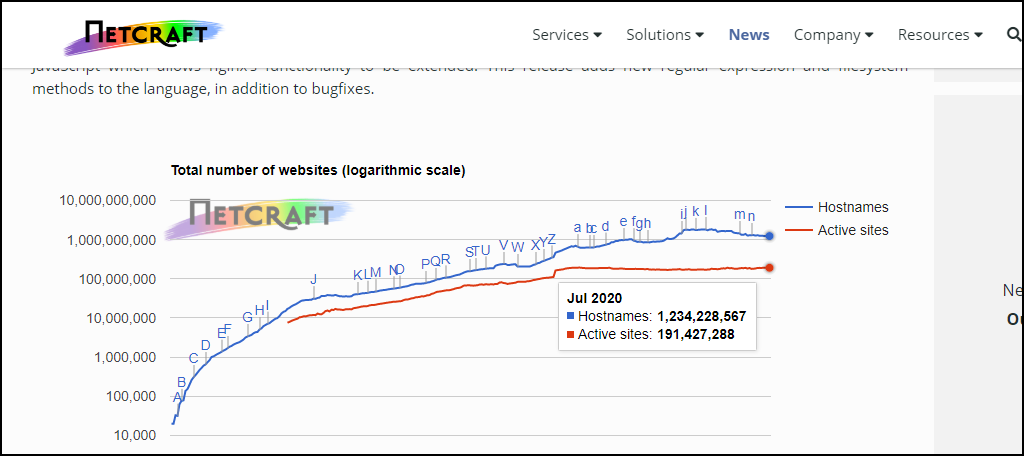As with many internet technologies and trends, people have been proclaiming that blogging is dead pretty much since blogs were created. The only thing we humans love more than building something up is tearing it down. So it’s not surprising that some without a personal stake in blogging are quick to say it’s dead, or passe.
But blogs are alive and thriving, and in this article, I aim to prove that point. Both with unimpeachable statistical proof, and completely unverifiable conjecture and wild speculation. Because conjecture and speculation are generally more fun than facts.
Anyone can cite facts, but it takes imagination to throw them to the wind.
There Are Three Kinds of Lies…
According to noted internet authority Mark Twain, there are three kinds of lies. One of them is statistics. We’re going to be talking about some statistics, so let’s make sure they’re as accurate as they can be.
The first step is to try to get a handle on how many active websites there are in the world. Meaning sites that have at least one page with unique content. It’s an important distinction to make because the overall numbers are kind of mind-boggling.
For example, did you know that there are more than a quarter-billion registered domain names? And according to most sources, almost two billion live websites.
A “live” website is a domain name that responds to an HTTP request. That means there’s something on it, but often it’s just a single page. The domain isn’t actually being used for a website; it’s “parked.” It may or may not host a site one day, so we don’t want to count those.
So how many real websites are there?
That number varies, of course, but as I’m writing this, Netcraft says the number is more than 191 million.

That’s a lot of websites.
But as you can see, the numbers tell us that only 1 in 10 “live” websites are actually “active.” So any time I mention percentages in this article, the percentage is calculated against 192 million—the number of active sites.
So, Are Blogs Still a Thing?
The tl;dr answer is yes.
Not only is blogging still relevant, but it’s booming. There are a few reasons to believe that.
First, WordPress.
It is without question the world’s most widely-used blogging software. But WordPress presents us with a problem when it comes to statistics. There are countless claims that “a third of all websites” use WordPress.
I assume that comes from statistics like these, that say 37% of the million most-visited websites use WordPress.
But we’re talking about all websites, not just the most popular. The same set of statistics tells us that more than 27 million websites use WordPress. Let’s round that up to 28 million. Now, I’m no mathematician, but 28 million is less than 15% of our 192 million active sites.
To add to the blurriness of the calculations, there are millions of users of wordpress.com, which may or may not be part of that 27 million number. Also, you could argue that every WordPress site isn’t a blog.
That’s true. But every WordPress site could include a blog since that’s what WordPress is, blogging software. So we’ll give those sites the benefit of the doubt and count them as blogs.
So we could stretch and say that 15% of the web consists of blogs based on WordPress use alone. And that doesn’t even count the other blog software out there, just WordPress.
But since WordPress has such a dominant market share, it’s going to make up a large percentage of all blogs.
If that 15% accounted for all of the websites that were blogs, that should be proof enough that blogging is far from dead.
But let’s not stop there.
The Kids and Their Tumblr
I have to level with you, I’m old. Like, using-the-internet-before-there-was-a-world-wide-web kind of old. I don’t know if that’s why I just don’t “get” Tumblr, but I don’t.
It’s like another world to me, one that speaks a language I don’t know. But it’s fair to call every Tumblr site a blog because that’s what they are.
Tumblr usage peaked at the end of 2012, but it still hosts over 100,000 blogs. That’s a mere drop in the WordPress bucket, but it’s still an impressive number, taken on its own.
The mostly young crowd who use Tumblr doesn’t seem to gravitate toward any other blogging platform. Maybe that’s one of the reasons some believe that blogging is dead. Because the kids aren’t excited about it.
But that’s a flawed concept considering kids can’t avoid growing up. And when they do, those who like to write will start blogs. They just won’t be on Tumblr.
Another possible reason for the belief in blogging’s demise could be the decline of other once-popular platforms. Remember LiveJournal? Or MySpace, Open Diary, Blogger, or Typepad?
They’re all still around, but their glory days have long passed. And the kids don’t want to know about any of them. They’re too busy TikToking or Gnip Gnopping or whatever they do when their bedroom doors are closed.
But again, I think hanging blogging’s popularity or future on the youth is misguided. Young people are always going to look for what’s new, and blogging isn’t that.
A Mercifully Brief History of Blogging

I’m going to go out on a limb and assume you know what a blog is since you’re reading one. The history of blogging isn’t particularly compelling, but it is interesting. Interesting in the way that all great ideas or inventions seem obvious in retrospect.
You look at them and think, “Well, of course that’s a good thing.”
Blogs are no different. Of course, a collection of articles or posts is a good thing. Obviously. It’s good because it’s a framework that can contain anything. It doesn’t matter if a blog is about international diplomacy or Chupacabra. They’re both valid, and they’re both blogs.
So who’s responsible for blogs? Who threw the first shovelful of coal into the locomotive that is blogging?
That would (probably) be Justin Hall and his links.net site. He’s been blogging on it since 1994, and it looks like it’s still 1994 over there. But that’s the beauty of a blog. It doesn’t matter what it looks like. What matters are the words. (Check out this documentary about Justin, it’s a fascinating slice of web history.)
His site, or homepage (oh man, I can hear the dialup modem now), was eventually referred to as a “weblog.” And since it was a waste of a syllable to say all that, it was ultimately shortened to “blog.”
And that’s the end of the history of blogs.
It’s the end because what you’re reading now and Justin’s site are more similar than they are different.
Which may be another in our list of reasons the unenlightened claim that blogging is dead. After all, how could an ancient technology from way back in 1994 possibly still be relevant?
How indeed.
If Blogging Is Dead, Where Did All These Readers Come From?
A third of Americans get their news online. And what are online news sites? Well, they’re blogs. That’s a pretty strong indication that blogs are still viable.
But here’s an even stronger indicator: 77% of internet users read blogs.
Wow. 77% is a lot. But how many people is that?
Almost three and a half billion.
You’d have a hard time convincing anyone that something used by three and a half billion people is irrelevant or dead. So we can put an end to that argument right here. It’s been neatly and indisputably disproven by a single statistic.
I suppose I could have just said that in the first sentence and submitted this as a 14-word article…
Are blogs dead?
No.
Three and a half billion people read them.
THE END
But something tells me that the boss wouldn’t find that very amusing. Besides, a 14-word post wouldn’t have room for the next section, which is the real meat of the matter.
How Starting a Blog Can Help You

So, I believe we’ve answered the “Are blogs dead?” question with a resounding no!
But is there any reason for you to start your own blog? I believe the answer to that is a resounding yes!
Here are a few reasons why.
- Personal blogging is a great way to establish yourself as a writer or an all-around person of interest. Or maybe you’re like Justin and are simply compelled to share. Whatever your motivation, a well-crafted personal blog can go a long way toward making your name known.
- Don’t forget that 77% of internet users read blogs. It’s not an easy number to forget, but it’s worth restating.
- Business blogging can set your company apart and foster customer loyalty. This is especially true if your business website doesn’t include much information about the people behind the brand. The more you share, the more your customers, and potential customers, care. The proof? Companies who blog get 97% more links to their websites. You read that right, 97% more links.
- It can help your website’s Google search results rankings. Websites that have a blog have 434% more indexed pages than those without a blog.
- Half of all bloggers report that blogging delivers strong marketing results.
- Bloggers are measurably cooler and better-looking people than the general population.
Okay, I made up the last point. But I did warn you that there would be some unverifiable conjecture.
If you want to raise your profile, blogging is one of the most effective methods you can use. Whether it’s your personal or professional profile, blogging just works.
Engagement is a marketing buzzword, but it’s the bread and butter of blogs. The ability to invite comments on what you’ve written is a double-edged sword. But if you manage them properly (and cultivate a thick skin), comments can be the best part of blogging.
What other form of writing instantly connects you to the people reading your work?
The wheels of traditional book publishing turn so slowly they often don’t appear to be moving at all. For print newspaper writers, comments (in the form of letters to the editor) could take days or weeks to arrive.
Blogs are unique in that way. If you need or value feedback—immediate feedback—nothing can beat a blog.
As Long as There Is a Web, There Will Be Blogs
Next time some pundit or prognosticator insists that blogging is dead, remind them that blogging is as alive and well.
Blogs will never die because our desire for human communication will never die. The internet was created to share information. The creators didn’t expect that information to include your neighbor’s thoughts about gophers, but isn’t it great that it does?
Blogs open the world to each of us. They connect us with people we would otherwise never hear. Our ancestors, even our recent ancestors, wouldn’t believe what we have at our fingertips.
There are valid arguments pointing out the less-than-wonderful effects the internet, and some blogs, have had on society and culture. But I would argue that the benefits far outweigh the drawbacks.
I also believe that any culture smart enough to create the internet is smart enough to eventually overcome its downside.
And now that you know the truth, it’s time to start your own blog. What are you waiting for? It’s easier than you think, and we’re here to help.

